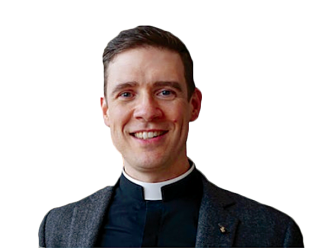
Andrew Bennett
The Reverend Andrew Bennett is a deacon of the Ukrainian Catholic Eparchy of Toronto and Eastern Canada.
Replacing "Fiducia supplicans’" confusions with clarity
In the Jan. 21 edition of The Catholic Register, Roderick ‘Rory’ Mckay published the article “Fiducia supplicans a blessing for the Church.” I wish to respond to him and others who assert something that is patently false.
Living liturgically means living differently
In an article published in the National Post on Dec. 29, columnist Joseph Brean queried the meaning of the week between Christmas Day and New Year’s. It was a curious piece. Brean asked what the week is all about concluding that it is “this least wonderful time of the year (that) is either an under-appreciated winter interlude of nothingness, or a bland calendrical purgatory of suspended animation.”
Pride goes before all our follies
Is our freedom absolute? If God is perfectly free, and we bear His image and likeness, are we not then perfectly free?
Engaging anti-Semitism rejects Christian roots
Some months ago in this space, I discussed the relationship between Catholics and Jews. I return to this question in the wake of the brutal, sadistic violence perpetrated by the terrorist organization Hamas against Jewish Israelis on Oct. 7.
Surprised by joy and rising in humility
What does it mean to be holy? To grow in holiness is to persevere in the life in Christ, to live out our baptism every day. The end goal of the life in Christ is to become a saint, to be divinized, to become like God. In sum, it is to achieve what we Byzantines call theosis: participation in the life of the Most Holy Trinity. This means that we must die to self each day and join ourselves ever more fully to Christ; we must strive to be Christ-like. St. John the Baptist summed this up when he declared, “He must increase, but I must decrease” (John 3:30). This process of decreasing requires repeated acts of the will: to pray daily, to confess regularly, to receive Holy Communion at least weekly, to undertake corporate and spiritual works of mercy, to be disciplined in our lives and to earnestly desire these things.
The Catholic choice is true dignity
It has been just over seven years since Canadian law has permitted euthanasia and assisted suicide on demand. In those seven years restriction after restriction on euthanasia provision has fallen and now we stand on the threshold of euthanizing the mentally ill and permitting the as-yet-undefined “mature minor” to end his or her life. Euthanasia is now presented to patients as a health care option.
Charity demands shaking hands at Mass
One of the most oft-quoted passages of the New Testament is 1 Corinthians 13:1: “If I speak in the tongues of men and of angels, but have not love, I am a noisy gong or a clanging cymbal.” The ensuing verses are probably the most popular option for the epistle in the Roman Catholic Nuptial Mass and why wouldn’t it be at an occasion when we are celebrating the love between the bride and groom?
False idols will forever fail us
As I write this column, I have completed my first three weeks of holidays in the UK. It is a much needed respite and an occasion to return to some old stomping grounds from when I pursued graduate studies. Being here in June, at the tail end of the university term, I revelled in the sublime beauty of English choral evensong in Oxford’s New College chapel and at Winchester and Salisbury cathedrals.
The new evangelization begins with ourselves
On the fifth Sunday of Easter in the Byzantine rite we commemorate the Samaritan woman at the well who meets Jesus and hears the Gospel preached. To Jews such as Our Lord the Samaritans were distinctly the “other,” worshipping God in a way that the Jews rejected. Among the many important aspects of this Gospel passage one that merits greater discussion in our day is the preaching of the Gospel to those who are not “us.” We encounter in the Gospels many occasions when Jesus meets non-Jews such as when He meets the Syro-Phoenician woman (Mark 7:24-30), or when the Roman centurion requests healing for his slave (Luke 7:2-10), or when He heals the Gerasene. Our Lord does not limit His saving ministry to His fellow Jews; He comes as the promised Messiah calling all people to salvation.
The Jews and us
As I write this column, the State of Israel and Jews around the world are preparing to celebrate Yom Haatzmaut marking Israel’s independence. This year’s celebration will be especially poignant as it is the 75th anniversary of the Jewish state — a country that has flourished and has become an example to the world of perseverance.

